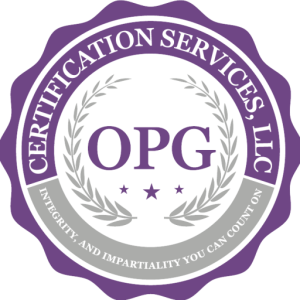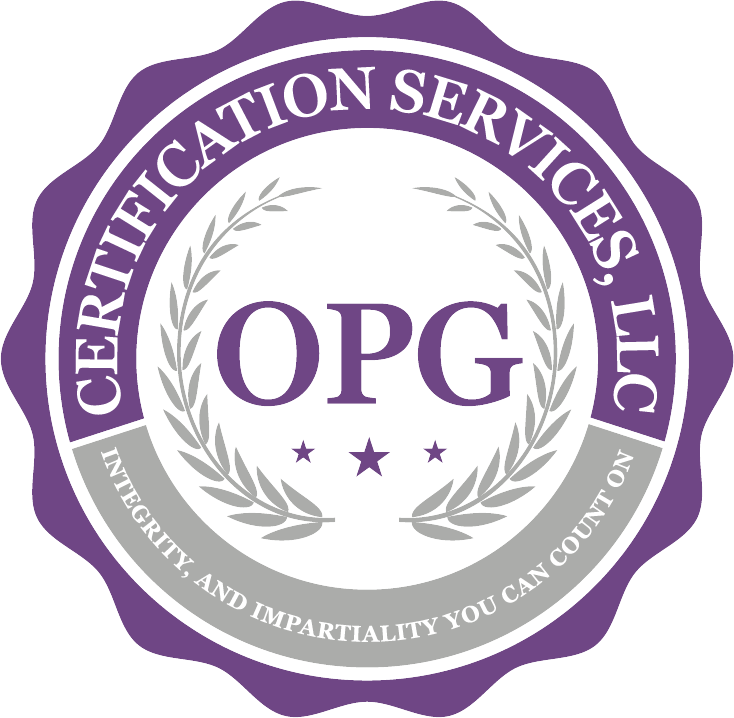OPG Certification Services
 Welcome to OPG Certification Services, LLC. OPG prides itself on performing robust, evidence-based audits for its clients, with strict adherence to industry standards related to impartiality and objectivity. Clients of OPG will find our audits provide a real-world assessment of their relevant systems, as well as opportunities to drive improvement.
Welcome to OPG Certification Services, LLC. OPG prides itself on performing robust, evidence-based audits for its clients, with strict adherence to industry standards related to impartiality and objectivity. Clients of OPG will find our audits provide a real-world assessment of their relevant systems, as well as opportunities to drive improvement.
What is OPG?
OPG is an acronym for “Organizational Paradigm Governance”.
What is an organizational paradigm?
The term “organizational paradigm” refers to the fundamental beliefs, values, and assumptions that underlie an organization’s culture and shape its behavior. These paradigms can vary widely among organizations, and they can have a significant impact on how the organization operates.
What is organizational paradigm governance?
“Organizational paradigm governance” refers to the set of principles and practices that guide the way an organization is structured, managed, and operates. It is essentially a framework that helps organizations establish and maintain an effective governance structure to ensure that the organization’s goals are met.
Organizational paradigm governance involves establishing clear lines of authority and accountability, defining decision-making processes, ensuring compliance with laws and regulations, and managing risk. It also involves ensuring that the organization is aligned with its strategic goals and that all stakeholders are informed and engaged in the organization’s activities.
In short, organizational paradigm governance is the way an organization establishes and maintains an effective system of governance to ensure that it operates in a way that is consistent with its values, goals, and legal obligations.
How does organizational paradigm governance relate to and align with ISO Standards?
ISO (International Organization for Standardization) is a global standard-setting body that develops and publishes international standards in a wide range of areas, including quality management, environmental management, service management, and information security. The ISO standards provide guidelines and best practices for organizations to improve their processes and systems, with the ultimate goal of enhancing customer satisfaction and achieving continuous improvement.
Organizational paradigm governance can align with and be supported by ISO standards in several ways:
- ISO standards can provide a framework for organizational governance. For example, the ISO 9001 standard for quality management provides a framework for establishing quality objectives, monitoring processes, and continuously improving performance. Organizations can use this framework to develop a governance system that ensures quality is a top priority and that processes are continually improved to meet changing needs.
- ISO standards can provide a benchmark for organizational performance. Many ISO standards include certification programs that allow organizations to demonstrate their compliance with the standard. This certification can be used as a benchmark for organizational performance, providing assurance to stakeholders that the organization is meeting established standards.
- ISO standards can provide a common language for organizational governance. ISO standards use standardized terminology and definitions, which can help organizations develop a shared understanding of key concepts and principles. This can be particularly important when working with international partners, where language and cultural differences can create communication challenges.
In summary, ISO standards provide a valuable framework, benchmark, and common language for organizational paradigm governance, helping organizations to establish and maintain an effective system of governance that is aligned with international best practices.
What are the tenets of organizational paradigm governance?
The tenets of organizational paradigm governance are the fundamental principles that underlie an effective system of organizational governance. These principles guide the behavior of the organization and its leaders, and they help ensure that the organization is aligned with its strategic goals and meets its legal and ethical obligations.
The specific tenants of organizational paradigm governance may vary depending on the organization and its goals, but some common tenants include:
- Accountability: The organization and its leaders are accountable for their actions and decisions. This includes being transparent about decision-making processes and taking responsibility for outcomes.
- Integrity: The organization and its leaders act with integrity, following ethical principles and values. This includes being honest, fair, and respectful in all interactions.
- Compliance: The organization and its leaders comply with applicable laws and regulations, as well as internal policies and procedures. This includes monitoring and managing risks to ensure compliance.
- Stewardship: The organization and its leaders act as responsible stewards of the resources entrusted to them. This includes managing resources effectively and efficiently, and ensuring they are used to support the organization’s goals.
- Strategic Alignment: The organization and its leaders align their actions and decisions with the organization’s strategic goals. This includes regularly reviewing and updating the organization’s goals and ensuring that all activities are consistent with those goals.
- Performance Management: The organization and its leaders establish and use performance metrics to measure progress and identify opportunities for improvement. This includes setting goals and targets, monitoring progress, and taking corrective action when necessary.
- Engagement: The organization and its leaders engage with stakeholders, including employees, customers, suppliers, and the wider community. This includes listening to feedback, addressing concerns, and communicating effectively.
In summary, the tenets of organizational paradigm governance provide a framework for organizations to establish an effective system of governance that supports their strategic goals, meets legal and ethical obligations, and acts with integrity and accountability.
